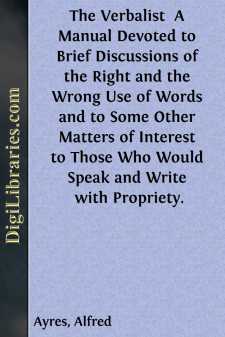Categories
- Antiques & Collectibles 13
- Architecture 36
- Art 48
- Bibles 22
- Biography & Autobiography 813
- Body, Mind & Spirit 142
- Business & Economics 28
- Children's Books 15
- Children's Fiction 12
- Computers 4
- Cooking 94
- Crafts & Hobbies 4
- Drama 346
- Education 46
- Family & Relationships 57
- Fiction 11828
- Games 19
- Gardening 17
- Health & Fitness 34
- History 1377
- House & Home 1
- Humor 147
- Juvenile Fiction 1873
- Juvenile Nonfiction 202
- Language Arts & Disciplines 88
- Law 16
- Literary Collections 686
- Literary Criticism 179
- Mathematics 13
- Medical 41
- Music 40
- Nature 179
- Non-Classifiable 1768
- Performing Arts 7
- Periodicals 1453
- Philosophy 64
- Photography 2
- Poetry 896
- Political Science 203
- Psychology 42
- Reference 154
- Religion 513
- Science 126
- Self-Help 84
- Social Science 81
- Sports & Recreation 34
- Study Aids 3
- Technology & Engineering 59
- Transportation 23
- Travel 463
- True Crime 29
The Verbalist A Manual Devoted to Brief Discussions of the Right and the Wrong Use of Words and to Some Other Matters of Interest to Those Who Would Speak and Write with Propriety.
by: Alfred Ayres
Categories:
Description:
Excerpt
PREFATORY NOTE.
The title-page sufficiently sets forth the end this little book is intended to serve.
For convenience' sake I have arranged in alphabetical order the subjects treated of, and for economy's sake I have kept in mind that "he that uses many words for the explaining of any subject doth, like the cuttle-fish, hide himself in his own ink."
The curious inquirer who sets himself to look for the learning in the book is advised that he will best find it in such works as George P. Marsh's "Lectures on the English Language," Fitzedward Hall's "Recent Exemplifications of False Philology," and "Modern English," Richard Grant White's "Words and Their Uses," Edward S. Gould's "Good English," William Mathews' "Words: their Use and Abuse," Dean Alford's "The Queen's English," George Washington Moon's "Bad English," and "The Dean's English," Blank's "Vulgarisms and Other Errors of Speech," Alexander Bain's "English Composition and Rhetoric," Bain's "Higher English Grammar," Bain's "Composition Grammar," Quackenbos' "Composition and Rhetoric," John Nichol's "English Composition," William Cobbett's "English Grammar," Peter Bullions' "English Grammar," Goold Brown's "Grammar of English Grammars," Graham's "English Synonymes," Crabb's "English Synonymes," Bigelow's "Handbook of Punctuation," and other kindred works.
Suggestions and criticisms are solicited, with the view of profiting by them in future editions.
If "The Verbalist" receive as kindly a welcome as its companion volume, "The Orthoëpist," has received, I shall be content.
A. A.
New York, October, 1881.
Eschew fine words as you would rouge.—Hare.
Cant is properly a double-distilled lie; the second power of a lie.—Carlyle.
If a gentleman be to study any language, it ought to be that of his own country.—Locke.
In language the unknown is generally taken for the magnificent.—Richard Grant White.
He who has a superlative for everything, wants a measure for the great or small.—Lavater.
Inaccurate writing is generally the expression of inaccurate thinking.—Richard Grant White.
To acquire a few tongues is the labor of a few years; but to be eloquent in one is the labor of a life.—Anonymous.
Words and thoughts are so inseparably connected that an artist in words is necessarily an artist in thoughts.-Wilson Flagg.
It is an invariable maxim that words which add nothing to the sense or to the clearness must diminish the force of the expression.—Campbell.
Propriety of thought and propriety of diction are commonly found together. Obscurity of expression generally springs from confusion of ideas.—Macaulay.
He who writes badly thinks badly. Confusedness in words can proceed from nothing but confusedness in the thoughts which give rise to them.—Cobbett.
A—An. The second form of the indefinite article is used for the sake of euphony only. Herein everybody agrees, but what everybody does not agree in is, that it is euphonious to use an before a word beginning with an aspirated h, when the accented syllable of the word is the second. For myself, so long as I continue to aspirate the h's in such words as heroic, harangue, and historical, I shall continue to use a before them; and when I adopt the Cockney mode of pronouncing such words, then I shall use an before them. To my ear it is just as euphonious to say, "I will crop off from the top of his young twigs a tender one, and will plant it upon an high mountain and eminent," as it is to say an harangue, an heroic, or an historical. An is well enough before the doubtful British aspiration, but before the distinct American aspiration it is wholly out of place. The reply will perhaps be, "But these h's are silent; the change of accent from the first syllable to the second neutralizes their aspiration." However true this may be in England, it is not at all true in America; hence we Americans should use a and not an before such h's until we decide to ape the Cockney mode of pronouncing them....


